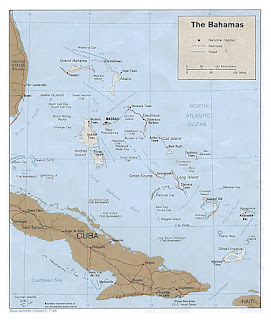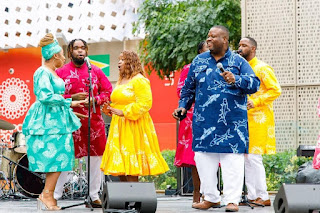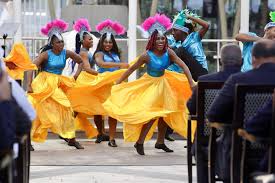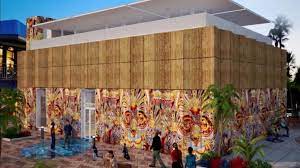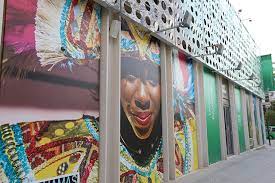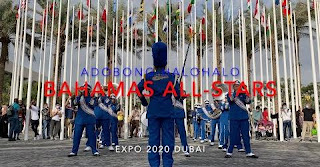The Bahamas at EXPO 2020 Dubai - Where poor planning and horrible communication reign supreme!
By Wilfred Burrows III
A critique of the overall showing of The Bahamas at Dubai EXPO 2020
MY TAKE ON EXPO 2020 - THE BAHAMAS 2-DAY EVENT
Let me first preface this post by clearly stating the following;
1. If you are a staunch FNM or PLP supporter, this is not the post for you!
2. If you don’t like to read long (albeit informative and entertaining) posts, this is not the post for you!
3. This is MY OPINION based on my account of what I saw against the facts of what was presented to the public and my own individual research. If you have a problem with my opinion in general, well, this is not the post for you!
4. Lastly, and most importantly, my critique of the overall showing of the Bahamas at EXPO 2020 in no way intended to attack or negatively target the scores of Bahamian performers who went out there and did their best to represent their country. I am a Bahamian and a performer and I know what it means to give it your all on a stage, even when you feel like the world is against you. So I say before I even delve into my take on EXPO, kudos to all of the performers for giving it your all in the capacity in which you were able to function and present your talents.
That being said, let’s begin with my take on the Bahamian delegation and the presence of the Bahamas at large at Expo 2020.
The Bahamas at EXPO 2020 - Where poor planning and horrible communication reign supreme!
I must start by stating vehemently that communication was ABYSMAL in regards to EVERYTHING related to Expo 2020 and The Bahamas National Day celebrations. Nowhere to my knowledge on any of the government social media platforms did they ever publish a listing or schedule of the events for these two days nor was anything communicated officially until the day before on The Bahamas Expo 2020 page (information that was then changed at the last minute).
Thankfully, there were some members in The ‘Bahamians in Dubai’ WhatsApp group (that I lurk in now that I’m a resident...lol) who constantly sought out information as best as they could about what was happening. Because of this, a week or so ago, there was a flyer posted in the aforementioned group that invited persons to a ‘Mix and Mingle’ event, slated for the 16th of January (more about that soon), to which there were two numbers to RSVP to. I called both numbers and got no answer, and sent a WhatsApp text message to RSVP to which I got no reply. Fine, I figured. It may be a ‘just come and show up’ type of event.
Only on the actual day of the event, the 16th January, there was a schedule shared (again via the WhatsApp group only) outlining what would be taking place for the two days (this was before we were made aware of the posting on Tthe Bahamas Expo 2020 page). Was this official? ...accurate? ...who knew, but at least it was something!
Due to the fact that I only received the schedule on that day around noon and previously was only aware of the mix and mingle at 6pm, I did not catch the other items slated for that day. Per the schedule, there was to be a concert by Shaback (more on that later as well), a performance by the Bahamas All Stars - and a performance by Daisy productions (definitely more on that as well).
I have seen some footage of Shaback and Daisy on social media - but did not see any of the band. It is not clear whether or not they performed…this could be due to the rain (yes it rained in Dubai…lol) but who knows!
Old people always say, “there’s a time and a place’...well in my humble opinion as someone who has spent his entire life on and off the stage, studying and teaching the performing arts, this was not the time nor place for Shaback nor Ms. Daisy.
I love both acts, however Shaback was put at a disadvantage by whoever made the decision to allow them to represent the country in the setting of a show choir, because simply put, they are not. They are a gospel group, a good one at that, but a gospel group nonetheless.
There were other national choirs who have trained and performed internationally in the show choir setting (Bahamas National Youth Choir and the Grand Bahama National Youth Choir for example) who would have been better suited.
Furthermore, Mr. Clint Watson as Press Secretary to the OPM will hopefully learn after this debacle - that in the world of politics, sacrifices in your personal life must be made to ethically fulfill certain roles. There is no way one can think that it is acceptable for him in his dual role as Press Secretary and leader - and director of Shaback - to have them travel and represent the Government, furthermore with him front and center!
Whether they were a show choir or not, it is simply not appropriate. If Shaback, in future, is to represent the Government in any capacity on the Government’s dime, it is my humble opinion that he needs to resign as leader to allow them to do so without any conflict of interest.
I have not seen any footage of The Bahamas All-Stars to know if they even performed or not (as I know there was rain, so it is possible this could not have happened...again I do not know). So, I will not provide any commentary on that - as I have not heard anything and thus have nothing to speak on from a basis of fact.
MS. DAISY WAS JUST A NO ALL AROUND. Like cringeworthy no.
Like when you see the disaster but can’t look away no, all the while just feeling worse as it keeps going no. KNOW YOUR AUDIENCE BAHAMAS!
As I already mentioned, I love a good Dynamite Daisy production, and I believe Terez is a talented individual, however - that was not appropriate. Ms. Daisy portrays an intoxicated Christian that was on full display in a Muslim nation. Do the math on that one. I do not even feel like anything further needs to be said on that. It was just a bad decision, period.
Moving on…after figuring out where the Mix and Mingle actually was - and arriving there, there was no clear instruction as to what one was to actually do. My brother (who was with me) and I were simply asked ‘Bahamas?’ - to which we replied ‘yes’, and that was it.
No one seated us, told us what to do, offered us a drink…nothing. No guest book, photo booth, no form or fashion to even log who was in attendance. "You know what? Fine", I said.
Again, trying to be optimistic, we figured we’d walk the room and try to see if anyone knew what was going on. Everyone seemed just as lost as us, but as this event has two different start times (flyer and sign at venue said 6, WhatsApp memo said 7), I figured maybe at 7 it will start officially. That wasn’t the case - and the evening just seemed haphazard and ‘mix up worse dan conch salad’, as we Bahamians would say (guess they got the mix part correct).
The official government delegates arrived around 7:30pm (30 minutes or 1 hour and 30 minutes late, depending on which start time you were going with), and after the Prime Minister said a few words to a small portion of the venue that were in earshot, they were all ushered to a special VIP seating area where they mixed and mingled with themselves (them being The Bahamas Government delegation and some local Government personnel; the VIPs).
We then noticed other members of the entertainment and entourage delegation had arrived. It was at this point, shortly after 8pm, I decided that my civic duty to country had been achieved and my mission was accomplished.
To be as transparent as possible, there was an open bar, so to the drinkers, that was a plus. There were different offerings of beers, wines and spirits…no Bahamian beers unfortunately at the Bahamian event though.
However, they did have some weird version of gully wash that, of course - since The Bahamas is Nassau only these days, they labeled ‘sky juice’ (even though the entire Bahamas outside of Nassau refers to it by its true Bahamian name).
In terms of food, they had soup served in a cup. T’was tasty, but not authentically Bahamian. Other items served to me; pizza/bagel bites knock-offs, a weird lasagna, some coconut bread pudding pie type concoction, and questionable conch fritters. Not sure what the VIPs were served, but I hope it was something more authentic - and a bit more formal.
This event honestly was a dismal display of Bahamian culture and the pride - we normally have and showcase when hosting guests in our home. Whether those guests were intended to be Bahamian locals or not, much more could have been done without costing extreme amounts of money.
Could the appetizer selection not have been a bit more authentic? I believe I pictured 2 ‘Bahamian-looking’ chefs in the kitchen that night.
For instance, could they not have created the soup to have been a seafood chowder, or lobster bisque?...and why lasagna?...bagel bites?
Furthermore, why didn’t you bring boxes of peanut cake, benny cake, Mortimer’s candies and other Bahamian treats that could be easily packaged, safely preserved and transported with your delegation? This is something I have done organizing events myself on both a small and large scale, and something I grew up watching my mom - and other members of different international service organizations she was a part of do every time they traveled internationally to represent the country.
The hosts of this mix and mingle (whoever they were as the only thing we knew for sure was that it was sponsored by FTX Digital Markets, who seem to be giving the Government a lot these days, and I can't help but wonder what do they want in return, but that's another conversation for another time and again, I digress) literally wrapped cans of peanuts with a white piece of paper that simply said ‘The Bahamas’ on it.
Is this the best we can do with months of planning and over a million dollars of funds? Lastly (on the mix and mingle), why were there no local hosts directing persons, checking in on guests, playing ‘host’ to this event?
For a mix and mingle event, why was it not designed to mix and mingle? There weren’t even highboy tables to invite conversation to take place.
This whole thing was just bad!
A lot more could have been done from the initial planning stages to the final touches to involve the local Bahamian community. I have only been here living in Dubai for four (4) months, and during my lurking time in the locals group, I sensed the frustration and defeat many had who tried to offer assistance to both an FNM, and PLP government - to no avail. But I digress.
Well, as bad as the mix and mingle was it cannot hold a candle to the abomination that is the Bahamas Pavilion! Let me preface this by saying that there are different themed districts at Expo.
We are in the Sustainability District which first of all, we really have no business being in (in my opinion). While I am not privy to what the selection process was for zoning, for what is being marketed back at home as the purpose of EXPO 2020 to the greater Bahamian economy, the Opportunity District is really where we should’ve been.
But, again, I digress. Let’s talk about the actual pavilion for a second. First of all, the entrance door was locked, with no signage to point any visitor to the pavilion how to actually get inside. Actually, no, let’s backtrack a bit and talk about the actual outer decor of the pavilion.
The entire building is wrapped in images of Junkanoo that have ‘Bahamas Strong’ at the bottom. I mean, I love Junkanoo just as much as the next Bahamian, but is that really all we are?
When compared to other nations who have such vivid imagery as a part of their exterior…you know what…before I get there, let me finish walk you through this Bahamas Pavilion experience.
So, after we figure out that you indeed need to enter through the exit, we walk in the pavilion. No one gives us any direction as to what to see, where to go….so we just start roaming about on our own trying to figure it out.
The best way to describe the pavilion in my honest opinion is ‘unfinished; a work in progress’, which three months into EXPO is inexcusable. There is no clear overriding theme to the exhibit…just posters everywhere.
There is a faint attempt to address sustainability to some extent, but again, we missed the mark greatly. Really, what has been chosen to display in the pavilion is not cohesive at all - and not even close to being a true representation of not only Bahamian history, culture, and artistry, but how we are even working across our islands to be sustainable in the present, and plans for future sustainability across our industries and day-to-day operations as a nation.
There was no native music playing on Sunday when I visited. It was also dirty, with boxes about.
Monday, it was clean and there was some Bahamian music playing. You know what, by that time, I had come to the realization that I should just take the small victories where I could.
Anyway, back to Sunday and the initial walk through…we had images of some government leaders displayed with no names or labels for people to even know who they are. The flag on the wall was not even the correct color, and the sail on the sloop was upside down (on Monday I was able to mention this to the one Bahamian worker who was there and she was very nice, responsive and said she would pass the message on to a Michael Diggiss…not sure who he is or his capacity, but hopefully he fixes the sail).
We really missed the mark with the pavilion - and it is honestly embarrassing, especially when looking at what other nations with similar pavilion size, GDP, demographic and population ratio were able to do with their pavilions.
I’ll expand briefly on my last point and use St. Vincent and the Grenadines. They have one fourth (1/4) of our population and approximately one twelfth (1/12) of our GDP. Their booth was similar in size, if not smaller. However, with those limiting factors, it was clear and very apparent from the moment you entered their pavilion who they were, and what the purpose was behind the exhibitions on display.
There was a clearly defined country profile for persons who knew nothing about the island, information about its history, its progress, opportunities for investment and growth (as they were located in the Opportunity District) - and a very expansive set of local product offerings for sale. As the young people say, St. Vincent understood the assignment.
Let’s talk about Monday now as there are a lot more positives on this day. Well, due to the fact that I work here in Dubai and unfortunately for me was not able to travel on the Government’s dime, my work commitments did not allow me to see the Junkanoo rush out and Royal Bahamas Police Force Band presentations, however - I have heard nothing but rave reviews for both acts from multiple sources.
Again, these are seasoned acts so I expected nothing less and was able to breathe a huge sigh of relief - as it seemed day 2 of 2 was heading in the right direction. Again, I spoke too soon.
As I mentioned earlier, communication was just horrid, so thus, there were different times communicated as to the start of the national ceremony.
Most were under the impression that it was 3:15 and thus were in place at the Al Wasl Dome at the aforementioned time. Clearly, as we soon found out, this was not the time, and it was changed to 4:35pm.
Well, what can you do!?! So, we chatted as Bahamians do, and immediately, the hot topic of conversation was the disaster of the pavilion.
But I’ve said enough on that already. Moving forward, 4:35pm the delegation comes out for the flag raising. We start with the UAE flag and national anthem, followed by our flag and national anthem. A chunk of the national anthem was missing (much like this accounting of these funds will be I’m sure) - but we just kept it moving and sang the next section as the ‘CD skipped’...lol. Remarks, remarks, then the show.
Remarks were fine from both the UAE and Prime Minister Davis. There was a little glitch at the beginning of the PM’s speech, but one thing with the old school generation, they always have a paper copy on deck.
Kudos to Brave. He weathered it well and kept it moving. He seemed a bit nervous in his presentation to me, but it could’ve just been me. Most importantly, he spoke clearly, he was short and concise.
Now starts the show.
Let’s just say I was underwhelmed. We had about ten (10) minutes of what felt like a last minute put-together journey of the Bahamas from the time of the Arawaks to present day.
Quite a bit of the ‘facts’ presented in the voice-overs were questionable. The group that was selected, not quite sure how they were (and we’ve already established that this is a theme a major issue with the delegation in general surrounding EXPO) - but they did their best with what they had.
It was clear to any veteran of the stage - that this was not something that was rehearsed for months. My biggest pet peeve was the ending of the short showcase where the dancers danced to pre-recorded Junkanoo music. Did we not have an entire Junkanoo group in Dubai at our disposal? Maybe I missed something.
Any-who, by 5pm it was over and everyone just left. So again, not knowing what was next, my brother and I after the events of the night before - decided we would go and get our own food before this Bahamian dinner at 6pm.
The Bahamian dinner was in fact not a Bahamian dinner at all, but just a hosted event at an EXPO restaurant with their regular food. No big deal for me personally at this point, because I was mentally prepared for this from yesterday. Where my anger grew immensely and my pressure rose to epic proportions was HERE AND NOW.
So based on both sets of agendas dispersed, there was to be a cultural show at 7pm in the Mobility District. Well, at 7pm there was no cultural show in the Mobility District and thus I was on the hunt for the show!
This was my highlight of this whole multi-million dollar 2 day delegation, and I was soooooo excited for the EXPO community to witness a Bahamian stage show, because if it’s ONE THING WE CAN DO, IS PUT ON A GOOD STAGE SHOW MUSICALLY!
Well, no one knew where it was. By no one, I mean all of the people employed by The Bahamas for EXPO who we saw.
So being the low-key Sherlock Holmes that I am, I went in full detective mode and was finally able to figure out - and then instruct the workers (who did not even know there was a show) where it was.
So, off I went with my brother in tow to find this show, which was in Jubilee Park, which is one of the huge stages for musical entertainment in EXPO.
WHEN I GOT THERE AND SAW THAT EMPTY LAWN, I WAS LIVID!
Clearly, this had not been communicated to the masses. Further, whoever planned this chain of events planned dinner during the cultural show, halfway across the EXPO site from each other.
WHY WOULD YOU PLAN FOR YOUR DELEGATION, VIP AND BAHAMIAN CITIZENS TO HAVE DINNER AT THE SAME TIME AS THE CULTURAL SHOW WOULD BE ON STAGE?!?!?!
Persons were eating away in the restaurant, and not even privy to the AMAZING SHOWCASE OF SOME BAHAMIAN MUSICAL TALENT on stage at that same moment. Let me be clear, THAT STAGE WAS ON FIRE!!!!
They commanded that stage and the audience, as few as they were, enjoyed the heck out of it! This was the most disappointing part of this 2-day rollercoaster for me (minus the pavilion of course).
The fact that no one even thought it necessary to have this closing act advertised for all to come and see. I was speechless. Still, I danced, sang, laughed and enjoyed my Bahamian people - and our music, and congratulated them with the loudest screams and cheers I could muster (after a full day’s work of course).
Alas, Bahamas at EXPO 2020 had come to an end.
While there were a few great moments, this was POORLY PLANNED AND EXECUTED. The FNM and the PLP Governments are equally to blame as they gave this no due care and attention and haphazardly slapped something together on the people’s dime.
There was no transparency and accountability as to how the selections were made for the acts. No counsel was sought from the key players in the Bahamian entertainment and culture fields; and it is already clear there will be many issues with accountability as it relates to the finances with this venture.
Let’s be very clear; I AM NOT SALTY. What I AM, is a proud BAHAMIAN who witnessed first hand how yet again, in 2022, WE ARE NOT IMPROVING AND DOING THE SAME OL BULL!
We need to really sit back and take stock - and be this change we keep promising every five (5) years. I will say this as I close; if the Government is ever serious about doing better, I am ready (as many other young, talented, educated Bahamians are) - and available to fulfill my civic duty to make this nation better.
If by some chance my Prime Minister sees or gets wind of this message, if the ‘New Day’ government wants to truly live up to its 2021 Election motto, I am praying that they use this experience as an opportunity to take stock and look at the many errors of their ways, and avoid excuses and simply DO BETTER. I guess only time will tell, and if nothing changes, I guess in four (4) years the FNM will be back in power and the cycle of ‘pot/kettle’ will continue.
Thank you for coming to my TED Talk.




